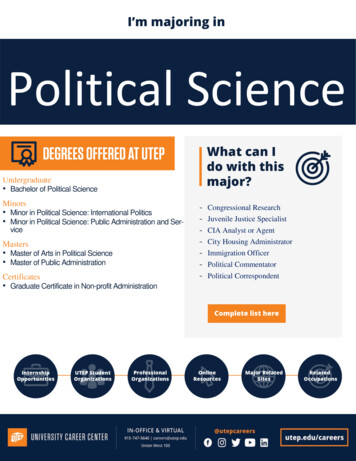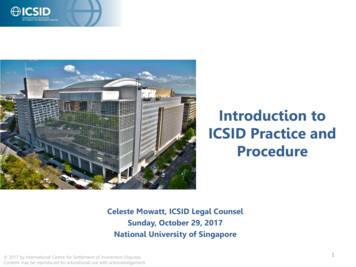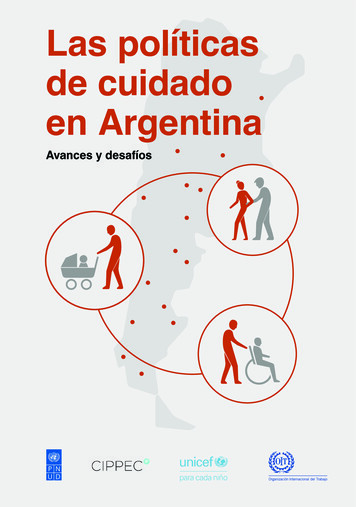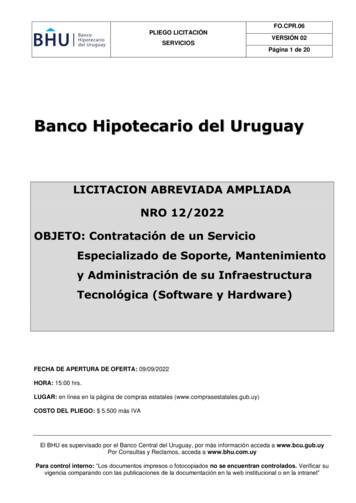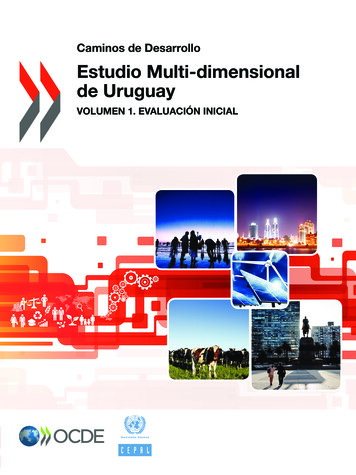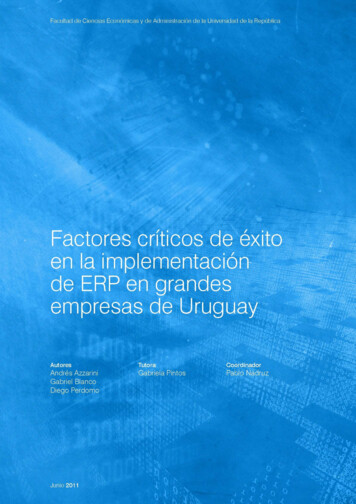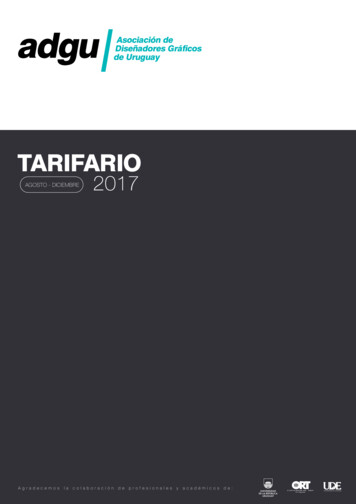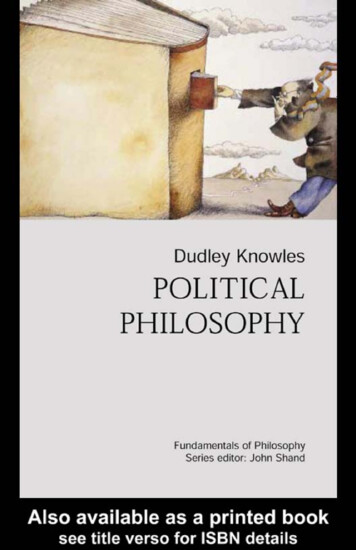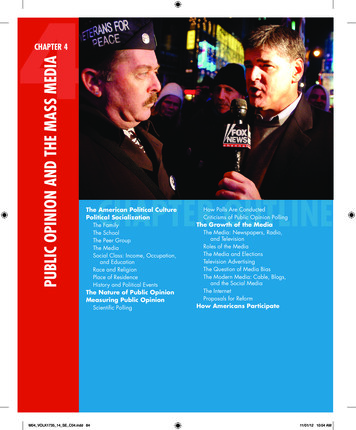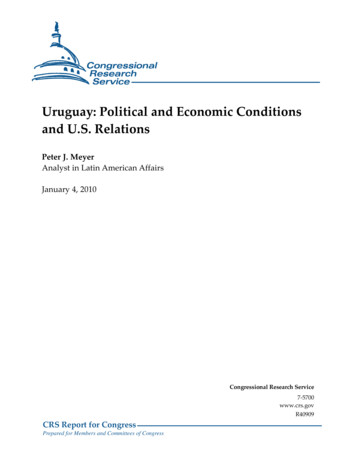
Transcription
Uruguay: Political and Economic Conditionsand U.S. RelationsPeter J. MeyerAnalyst in Latin American AffairsJanuary 4, 2010Congressional Research Service7-5700www.crs.govR40909CRS Report for CongressPrepared for Members and Committees of Congress
Uruguay: Political and Economic Conditions and U.S. RelationsSummaryOn November 29, 2009, Senator José “Pepe” Mujica of the ruling center-left Broad Frontcoalition was elected president of Uruguay, a relatively economically developed and politicallystable South American country of 3.5 million people. Mujica, a former leader of the leftistTupamaro urban guerilla movement that fought against the Uruguayan government in the 1960sand 1970s, defeated former President Luis Alberto Lacalle (1990-1995) of the center-rightNational Party in the country’s sixth consecutive democratic election since its 12-yeardictatorship ended in 1985. Mujica was forced to contest a runoff after he failed to win anabsolute majority of the vote in the October 2009 first-round election. In legislative elections heldconcurrently with the first-round vote, the Broad Front retained its majorities in both houses ofthe Uruguayan Congress. The new legislature and President are to be inaugurated to theirrespective five-year terms on February 15 and March 1, 2010.Mujica will replace popular incumbent President Tabaré Vázquez, who was constitutionallyineligible to run for a second consecutive term. Vázquez’s 2004 victory ended 170 years ofpolitical domination by the National and Colorado parties. Throughout his term, Vázquez hasfollowed the moderate social democratic paths of the left-of-center governments of Brazil andChile, advancing market-oriented economic policies while instituting social welfare programsintended to reduce poverty and inequality. The Vázquez Administration’s policies appear to havebeen reasonably successful, as they—along with a boom in global commodity prices—havecontributed to several years of strong economic growth and considerable reductions in poverty.Beyond economic and social welfare policy, Vázquez has done much to address Uruguay’sdictatorship-era human rights violations and expand rights to the country’s homosexualpopulation.Uruguay has enjoyed friendly relations with the United States since its transition back todemocracy, though it traditionally has had closer ties to Europe and its South Americanneighbors, Argentina and Brazil. Commercial ties between Uruguay and the United States haveexpanded substantially in recent years, with the countries signing a bilateral investment treaty in2004 and a Trade and Investment Framework Agreement in January 2007. The United States andUruguay have also cooperated on military matters, with both countries playing significant roles inthe United Nations Stabilization Mission in Haiti. Relations are likely to remain close in thecoming years as the Obama Administration and President-elect Mujica have announced theirmutual desire to further strengthen bilateral ties.On September 14, 2009, the ATPDEA Expansion and Extension Act of 2009 (S. 1665, Lugar) wasintroduced in the Senate. Among other provisions, the bill would amend the Andean TradePromotion and Drug Eradication Act (Title XXXI of the Trade Act of 2002, P.L. 107-210) toprovide unilateral trade preferences to Uruguay. Under the bill, certain Uruguayan products, suchas wool-based textiles, would be eligible to receive duty-free or reduced tariff treatment untilDecember 31, 2012.This report examines recent political and economic developments in Uruguay as well as issues inU.S.-Uruguayan relations.Congressional Research Service
Uruguay: Political and Economic Conditions and U.S. RelationsContentsPolitical and Economic Situation.1Vázquez Administration.2Economic and Social Welfare Policy .2Human Rights .4Social Issues .42009 Elections .5Results .5Prospects for the Mujica Administration.7U.S.-Uruguay Relations .8Trade .8Peacekeeping Operations . 10FiguresFigure 1. Map of Uruguay .1Figure 2. Party Affiliation in Uruguay’s Lower House .6TablesTable 1. U.S.-Uruguay Merchandise Trade, 2003-2008.9ContactsAuthor Contact Information . 11Congressional Research Service
Uruguay: Political and Economic Conditions and U.S. RelationsFigure 1. Map of UruguaySource: Map Resources. Adapted by CRS Graphics.Political and Economic SituationOn November 29, 2009, Senator José “Pepe” Mujica of the ruling center-left Broad Front (FA)coalition was elected president of Uruguay in a second-round runoff vote. In legislative electionsheld concurrently with the October 25, 2009, first-round vote, the FA retained its majorities inboth houses of the Uruguayan Congress. The new legislature and President are to be inauguratedto their respective five-year terms on February 15 and March 1, 2010. Mujica will replace popularincumbent President Tabaré Vázquez, who was constitutionally ineligible to run for a secondconsecutive term. Most analysts expect broad policy continuity from the Mujica Administration.Congressional Research Service1
Uruguay: Political and Economic Conditions and U.S. RelationsVázquez AdministrationPresident Tabaré Vázquez was inaugurated to a five-year term in March 2005. By winning thepresidency and securing FA majorities in both houses of the Uruguayan Congress, Vázquez ended170 years of political domination by the National (PN) and Colorado (PC) parties and ushered inthe country’s first left-leaning government. 1 Throughout his term, President Vázquez hasfollowed the moderate social democratic paths of the left-of-center governments of Brazil andChile, advancing market-oriented economic policies while instituting social welfare programsintended to reduce poverty and inequality. He has maintained considerable popular support,receiving a 80% approval rating in December 2009.2Economic and Social Welfare PolicyAlthough Uruguay has long been one of Latin America’s most stable economies, it experienced amajor economic and financial crisis between 1999 and 2002. During the crisis—which wasprincipally the result of the spillover effects of the economic problems of its much largerneighbors, Argentina and Brazil—Uruguay’s economy contracted by 11%, unemploymentclimbed to 21%, and over one-third of the country’s 3.5 million citizens found themselves livingbelow the poverty line. 3 While economic stability returned to Uruguay prior to the 2004 election,some international investors were worried about the possible economic policies of the Vázquezgovernment. In order to calm investor fears, Vázquez signed a three-year, 1.1 billion stand-byarrangement with the International Monetary Fund (IMF) shortly after taking office. Theagreement committed Uruguay to a substantial primary fiscal surplus, low inflation, considerablereductions in external debt, and several structural reforms designed to improve competitivenessand attract foreign investment. Although Uruguay terminated the agreement in 2006 following theearly repayment of its IMF debt, it has maintained a number of the policy commitments.4The Vázquez Administration has also done much to address poverty and inequality throughout itsterm, though it has been criticized by some of the more leftist sectors of the FA for allegedlysubordinating social welfare concerns to the maintenance of market-friendly economic policies.In the first months of his administration, Vázquez created a ministry of Social Development andsought to reduce the country’s poverty rate with a 240 million National Plan to Address theSocial Emergency (PANES). PANES provided a monthly conditional cash transfer ofapproximately 75 to over 100,000 households in extreme poverty. In exchange, those receivingthe benefits were required to participate in community work and ensure that their childrenattended school daily and had regular health checkups. PANES included a number of otherinitiatives as well, such as food purchase cards, new homeless shelters, an expansion of freehealth coverage, and job training programs. In late 2007, PANES was replaced with the Plan for1The PN and PC were historically ideologically heterogeneous parties, with the PC affiliated with urban groups and thePN representing rural areas. The PC and PN have become more ideologically homogenous (both center-right) since the1971 foundation of the FA, however, as the center-left coalition has attracted the left-leaning sectors of the traditionalparties. Uruguay: a country study, ed. Rex A. Hudson & Sandra W. Meditz, 2nd ed. (Washington, DC: FederalResearch Division, Library of Congress, 1992).2Yanina Olivera, “Vázquez, con 80% de popularidad, busca reafirmar su huella en Uruguay” Agence France Presse,December 23, 2009.3“Uruguay: Leftist Coalition Takes Power,” Latin America Data Base NotiSur, March 4, 2005; Pablo Alfano,“Uruguay: A Chance to Leave Poverty Behind,” Inter Press Service, September 3, 2009.4“Country Profile: Uruguay,” Economist Intelligence Unit, 2008.Congressional Research Service2
Uruguay: Political and Economic Conditions and U.S. RelationsSocial Equity. Vázquez has recently introduced two programs designed to expand opportunitythrough technology: Plan Ceibal, which provides all public school students in Uruguay with afree personal computer, and Plan Cardales, which provides low-income families with subsidizedaccess to telephone, television, and Internet services.5In addition to the administration’s social welfare programs, Vázquez passed a law forbiddingdiscrimination against workers for labor activities, and reestablished tripartite wage councils—composed of representatives of government, businesses, and unions—to negotiate wages forapproximately 100,000 firms and 600,000 workers.6 The labor reforms have considerablyincreased the power of unions, playing a substantial role in the percentage of unionized workersmore than doubling between 2005 and 2007 to approximately 24% of the labor force. Moreover,the Vázquez Administration and the FA have overhauled the tax system to make it moreprogressive, reducing the value-added tax and replacing the tax on wages with a personal incometax that exempts the poorest 60%.7The Vázquez Administration’s economic and social welfare policies, along with the recent boomin commodity prices—which significantly affect Uruguay’s primarily agricultural economy8—have contributed to several years of strong economic growth and considerable reductions inpoverty. Since 2005, Uruguay’s real gross domestic product (GDP) has grown by an average of7% per year, the country’s debt has fallen from 66% of GDP to 26% of GDP, and investment hasincreased to 19% of GDP, the highest rate in the country’s history. 9 Likewise, between 2004 and2009, the poverty rate in Uruguay fell from 31.9% to 20.3% and extreme poverty fell from 4.2%to 1.4%, while real wages increased 18% and household income increased 30%.10 Uruguayremains one of the most developed countries in Latin America, with an adult literacy rate ofnearly 98%, a life expectancy of 76 years, and a 2008 per capita income of 8,260.11 Althoughthe global financial crisis has significantly slowed the Uruguayan economy with a 2.3%contraction in the first quarter of 2009, economic growth returned in the second quarter and theeconomy is expected to have grown 0.6% in 2009.125Pablo Alfano, “Uruguay: A Chance to Leave Poverty Behind,” Inter Press Service, September 3, 2009; “Uruguay:Growth uptick boosts FA’s electoral hopes,” Oxford Analytica, September 21, 2009.6The tripartite wage councils—created in 1943—were disbanded by the country’s authoritarian government beforebeing reestablished by President Sanguinetti (1985-1990, 1995-2000) at the return to democracy. Between 1991 and2006, however, councils were only convened for the construction, health, transport, and state sectors. “Uruguay risk:Labour market risk,” Economist Intelligence Unit, January 15, 2009.7“Country Profile: Uruguay,” Economist Intelligence Unit, 2008.8While nearly all of Uruguay’s territory is dedicated to agricultural production (primarily beef, dairy products, rice,wheat, and soy), the country also has a small manufacturing sector (e.g., leather and cellulose pulp), an importantregional financial sector, and a services sector specializing in a wide variety of activities, including tourism. “CountryProfile: Uruguay,” Economist Intelligence Unit, 2008.9“Country Report: Uruguay,” Economist Intelligence Unit, September 2009; “Astori: Uruguay necesita otro gobiernode izquierda para ‘profundizar logros,’” EFE News Service, October 13, 2009.10“Tabaré: ‘La gente que recibió apoyo del Panes no dilapidó, lo necesitaba,” La Republica (Uruguay), August 26,2009; Pablo Alfano, “Uruguay: A Chance to Leave Poverty Behind,” Inter Press Service, September 3, 2009.11United Nations Development Program, “Human Development Report,” 2009; World Bank, “World DevelopmentReport,” 2010.12“Uruguay: Growth uptick boosts FA’s electoral hopes,” Oxford Analytica, September 21, 2009; InternationalMonetary Fund, “World Economic Outlook,” October 2009.Congressional Research Service3
Uruguay: Political and Economic Conditions and U.S. RelationsHuman RightsVázquez and the FA have done much to address Uruguay’s dictatorship-era (1973-1985) humanrights violations, which had been largely ignored by other administrations. During the country’s12 years of authoritarian rule, tens of thousands of Uruguayan citizens were forced into politicalexile, 3,000-4,000 were imprisoned, and several hundred were “disappeared” or killed.Nonetheless, the only official action taken by previous governments to investigate the country’spast was the creation of a peace commission, which was active between 2000 and 2003, and onlylooked into those who had been “disappeared.”13 Furthermore, the peace commission only had aninvestigative mandate since the country’s amnesty law—passed in 1986 and ratified in a nationalreferendum in 1989—treats dictatorship-era crimes with impunity.Immediately after his election, Vázquez initiated investigations into the government’s humanrights abuses during the authoritarian period. Since then, excavations of military barracks haveturned up the remains of some of the “disappeared,” files from the dictatorship have been releasedto the public, and the state has agreed to provide compensation to the those who were imprisonedfor political reasons and the families of those who were killed. The Vázquez Administration alsoreinterpreted the amnesty law to exclude crimes committed outside Uruguay as a part of theregional coordination plan to eliminate political dissidents known as “Operation Condor.” As aresult, a number of former members of the military and police have been tried and jailed,including former dictators Juan María Bordaberry (1973-1976) and Gregorio Álvarez (19811985).14 Some former members of the security forces, who believe that their actions werenecessary to defend the country from ideological subversives, have criticized the FA for allegedlyseeking to rewrite the country’s history.15 Although a referendum to repeal the country’s amnestylaw was rejected in the October 2009 general election, an Uruguayan Supreme Court rulingissued several days before the election found the application of the amnesty law in a caseinvolving the 1974 death of a political prisoner to be unconstitutional. The ruling potentiallycould lead to the reopening of additional cases. 16Social IssuesSocial issues have figured prominently in Uruguayan politics in recent years. In December 2007,Uruguay became the first Latin American nation to approve civil unions between homosexuals.The law grants civil unions inheritance, pension, and child custody rights similar to those ofUruguayan marriages. Uruguay has since lifted its ban on homosexuals serving in the militaryand approved a law allowing homosexuals to adopt children, another Latin American first.17 In13Eugenia Allier, "The Peace Commisssion: A Consensus on the Recent Past in Uruguay?," European Review of LatinAmerican and Caribbean Studies, vol. 81 (October 2006).14Although Bordaberry was elected in 1971 and inaugurated in 1972, he entered into a pact with the military in 1973that dissolved Congress and installed an authoritarian government. Four different leaders governed Uruguay over thecourse of the 12-year dictatorship. Uruguay: a country study, ed. Rex A. Hudson & Sandra W. Meditz, 2nd ed.(Washington, DC: Federal Research Division, Library of Congress, 1992).15“Uruguay Investigates Human Rights Crimes From Dictatorship Era,” Latin America Data Base NotiSur, July 1,2005; “Dictatorship files made public in Uruguay,” Latin News Daily, June 8, 2007; “Uruguay reconoceresponsabilidad del Estado en represión durante la dictadura,” EFE News Service, September 10, 2009; “Courtsentences Uruguayan ex-security agents for Condor crimes,” EFE News Service.16“Uruguay court rules against amnesty law,” Latin News Daily, Octoebr 20, 2009.17“Uruguay OKs gay unions in Latin American first,” Reuters, December 18, 2007; Yanina Olivera, “Uruguayapproves Latin America’s first gay adoption law,” Agence France Presse, September 9, 2009.Congressional Research Service4
Uruguay: Political and Economic Conditions and U.S. RelationsNovember 2008, the Uruguayan Congress passed a bill to legalize abortion in the first 12 weeksof pregnancy under certain circumstances, such as the woman’s health being at risk or extremepoverty. Although the bill was supported by the FA and a majority of Uruguayans, PresidentVázquez vetoed it. Following the veto, Vázquez resigned his position as head of the SocialistParty18 due to differences on the issue. Under existing Uruguayan law, abortion is illegal but awoman does not face sanction if the pregnancy resulted from rape or endangered the woman’slife. 192009 ElectionsResultsOn November 29, 2009, Senator José “Pepe” Mujica of the ruling center-left FA coalition waselected president of Uruguay in a second-round runoff vote. Mujica defeated former PresidentLuis Alberto Lacalle (1990-1995) of the center-right PN, 53% to 43%.20 The runoff was triggeredafter none of the candidates received an absolute majority of the vote in the October 25, 2009,first-round election. Mujica was the leading presidential vote-getter in the first round, winning thesupport of 48% of the electorate, while Lacalle took 29%, Pedro Bordaberry of the center-rightPC won 17%, Pablo Mieres of the centrist Independent Party (PI) won 2.5%, and Raúl Rodríguezof the leftist Popular Assembly (AP) took 0.7%. Bordaberry and the PC backed Lacalle in thesecond round, while Mieres and the PI remained neutral and Rodríguez and the AP called on theirsupporters to cast spoiled ballots in rejection of both candidates.21Since voters in Uruguay must cast party-line presidential and legislative votes, congressionalrepresentation closely reflects the first-round presidential vote. When the new Congress takesoffice on February 15, 2010, the FA will maintain its legislative majorities, with 50 seats in the99-seat House of Representatives and 16 seats in the 30-seat Senate. 22 Likewise, the PN willremain the principal opposition force with 30 seats in the House and nine seats in the Senate,while the PC will once again be the third-largest political force in the Congress with 17 seats inthe House and five seats in the Senate. The PI will hold two seats in the House.23 While the PCsignificantly increased its representation in both houses, its gains came largely at the expense ofthe PN, and the ideological balance of power of the Uruguayan Congress will remain roughly thesame as it has been for the past five years (See Figure 2).18The FA is composed of several parties or factions, including the Socialist Party.19Veronica Psetizki, “Abortion move divides Uruguay,” BBC News, November 12, 2008; “Vázquez resigns as partyhead in Uruguay,” Latin News Daily, December 4, 2008.20“Mujica 52,59% y Lacalle 43,32% con 100% de las mesas escrutadas en Uruguay,” Agence France Presse,November 30, 2009.21"Tendencias: FA dejó de crecer; blancos oscilan," El País (Uruguay), October 27, 2009; "Uruguay: Partido Coloradoapoyó a Lacalle para segunda vuelta electoral," Agence France Presse, October 28, 2009. “Uruguay: PartidoIndependiente neutral en balotaje Mujica-Lacalle,” Agence France Presse, October 30, 2009.22Vice President-elect Danilo Astori will preside over the Senate as its 31st member, providing the FA with a 17th vote.23“Hoy proclaman balotaje; banca 50 para el Frente,” El País (Uruguay), November 1, 2009.Congressional Research Service5
Uruguay: Political and Economic Conditions and U.S. RelationsFigure 2. Party Affiliation in Uruguay’s Lower House2004 and 2009 Election ResultsSource: CRS Graphics.Two referenda were held along with the October 2009 first-round election. One would havegranted the more than 500,000 Uruguayan citizens residing abroad the right to vote absentee.Currently, Uruguayans must return to the country in order to cast a ballot. This extension ofvoting rights was opposed by the PC and PN since most of those living abroad—such as citizenswho fled the country’s right-wing dictatorship (1973-1985)—are perceived to be moresympathetic to the FA. Some also argued that those who reside abroad should have no say in thepolicies that will affect the lives of those actually living in Uruguay.24 The other referendumwould have annulled the amnesty that was granted to the military and police following the returnto democracy for crimes committed during the country’s dictatorship. Those opposed to annullingthe amnesty law noted that it was ratified with 56% of the vote in a 1989 referendum. Some alsoalleged that the referendum fomented persecution of the security forces while ignoring the crimesthat were committed by the country’s leftist guerilla group.25 Both referenda failed to gain theabsolute majorities needed to be approved, with the extension of voting rights to citizens abroadand the amnesty repeal winning the support of 37% and 47% of Uruguayans, respectively. 2624Claudio Aliscioni, “Un plebiscito que puede cambiar el sistema electoral de los uruguayos,” Clarín (Argentina),October 24, 2009.25Juan Antonio Sanz, “Uruguay decide sobre crímenes de la dictadura y el voto de sus emigrantes,” EFE News Service,October 16, 2009.26“Plebiscitos: falta de difusión del Frente Amplio,” El País (Uruguay), October 27, 2009.Congressional Research Service6
Uruguay: Political and Economic Conditions and U.S. RelationsProspects for the Mujica AdministrationPresident-elect José Mujica was imprisoned for 14 years as a result of his activities as one of theleaders of the Tupamaro National Liberal Movement, a leftist urban guerilla group that operatedin Uruguay during the 1960s and 70s, but he has adopted a more moderate profile since the end ofthe country’s authoritarian period. Following the return to democracy, Mujica helped found thePopular Participation Movement (MPP), which is currently the largest faction within the FAcoalition. He was elected to Uruguay’s lower house in 1994 and to the Senate in 1999, beforeserving as minister of livestock, agriculture, and fisheries during the Vázquez Administration.Although he hails from a more left-leaning faction of the FA, Mujica has developed a reputationas a pragmatist and consensus-builder. He has already reached out to the political opposition,offering appointments to state companies and autonomous entities, and setting up multi-partisantechnical commissions to develop security, education, energy, and environmental policy.27While his campaign opponents attacked Mujica’s past to portray him as a radical departure fromthe Vázquez government, most analysts maintain that the Mujica Administration’s policies arelikely to closely resemble those of his predecessor.28 Mujica selected Danilo Astori—a competitorfor the FA presidential nomination who served as economy minister during the VázquezAdministration—as his running-mate in order to reassure voters and investors that he wascommitted to maintaining Uruguay’s market-oriented economic policies. Mujica has said that heintends to delegate economic policy to Astori, and economic posts in the administration areexpected to be filled by leaders associated with Astori’s more centrist faction of the FA, the LíberSeregni Front (FLS). Members of the FLS have reportedly been selected to head the economy,tourism, and transportation ministries. 29 Analysts also expect Mujica to broadly maintain theVázquez Administration’s social welfare and foreign policies, though he may place moreemphasis on domestic redistribution and regional integration.30 The more left-leaning sectors ofthe FA, such as Mujica’s MPP, will reportedly control the foreign and defense ministries, as wellas the majority of the social ministries.31Although FA majorities in both houses of Congress will enable the Mujica Administration toadvance its legislative agenda without needing to negotiate with the political opposition, policieswill likely be moderated by the need to establish consensus among the various ideologicalfactions of the coalition. Some analysts have suggested that divisions within the FA—both in theCabinet and the Congress—may arise if the economic environment inhibits increases in publicspending. Uruguay’s economic growth in the near term is unlikely to equal that of recent yearsdespite the country experiencing only a minor recession as a result of the global financial crisis.Private analysts have predicted that GDP growth will average 3% in 2010 and 2011.3227“Uruguay: Mujica makes big gesture to opposition,” Latin American Weekly Report, December 10, 2009.28“‘Mujica tiene un pensamiento chavista, castrista, sesentista, orgánico, completo,’” El País (Uruguay), September27, 2009; “Uruguay politics: Mujica wins, continuity ahead,” Economist Intelligence Unit, November 30, 2009;“Uruguay: Mujica promises more continuity than change,” Oxford Analytica, December 2, 2009.29“Presidente electo de Uruguay comienza a definir su futuro gabinete,” EFE News Service, December 5, 2009.30Oscar Vilas, “Continuidad en economía sin que se descarten herramientas nuevas,” El País (Uruguay), November 30,3009; Patricia Avila, “Fórmula izquierda Uruguay considera ‘estratégico’ al Mercosur,” Reuters, October 24, 2009.31“Presidente electo de Uruguay comienza a definir su futuro gabinete,” EFE News Service, December 5, 2009.32“Uruguay politics: Mujica wins, continuity ahead,” Economist Intelligence Unit, November 30, 2009 “CountryReport: Uruguay,” Economist Intelligence Unit, December 2009.Congressional Research Service7
Uruguay: Political and Economic Conditions and U.S. RelationsU.S.-Uruguay RelationsUruguay enjoys friendly relations with the United States, though it traditionally has had closerties to Europe (the origin of the vast majority of the population)33 and its South Americanneighbors. Ties between Uruguay and the United States have increased in recent years, especiallysince the administration of Jorge Batlle (2000-2005), which closely aligned itself with the UnitedStates. In 2002, the United States provided Uruguay with a one week balance of payments loan toassist the country in countering the fallout from the Argentine financial crisis. Moreover, Batllelaid the groundwork for ongoing trade discussions with the United States through the 2002creation of a Joint Commission on Trade and Investment (see “Trade” below).While many analysts expected the Vázquez Administration to distance the country from theUnited States and forge closer relations with fellow members of the Common Market of the South(Mercosur)34 once it took office, those predictions have not been borne out. Ongoing disputeswithin Mercosur over trade asymmetries and a bitter conflict with Argentina over the constructionof a cellulose pulp mill along the shared Uruguay River have led to frosty relations betweenUruguay and its neighbors. Likewise, the Vázquez Administration has sought to strengthen tieswith the United States in order to diversify its trade relations and reduce its economic reliance onArgentina and Brazil, which played a significant role in the country’s 1999-2002 recession.President-elect Mujica has indicated that he will prioritize relations with Uruguay’s neighbors andpush for increased regional integration through Mercosur. Nonetheless, he has also expressed hisdesire to continue strengthening U.S.-Uruguay relations and will likely build upon the bilateralagreements signed during the Vázquez Administration.35 Additionally, Mujica may attempt t
Profile: Uruguay," Economist Intelligence Unit, 2008. 9 "Country Report: Uruguay," Economist Intelligence Unit, September 2009; "Astori: Uruguay necesita otro gobierno de izquierda para 'profundizar logros,'" EFE News Service, October 13, 2009. 10 "Tabaré: 'La gente que recibió apoyo del Panes no dilapidó, lo necesitaba,"
